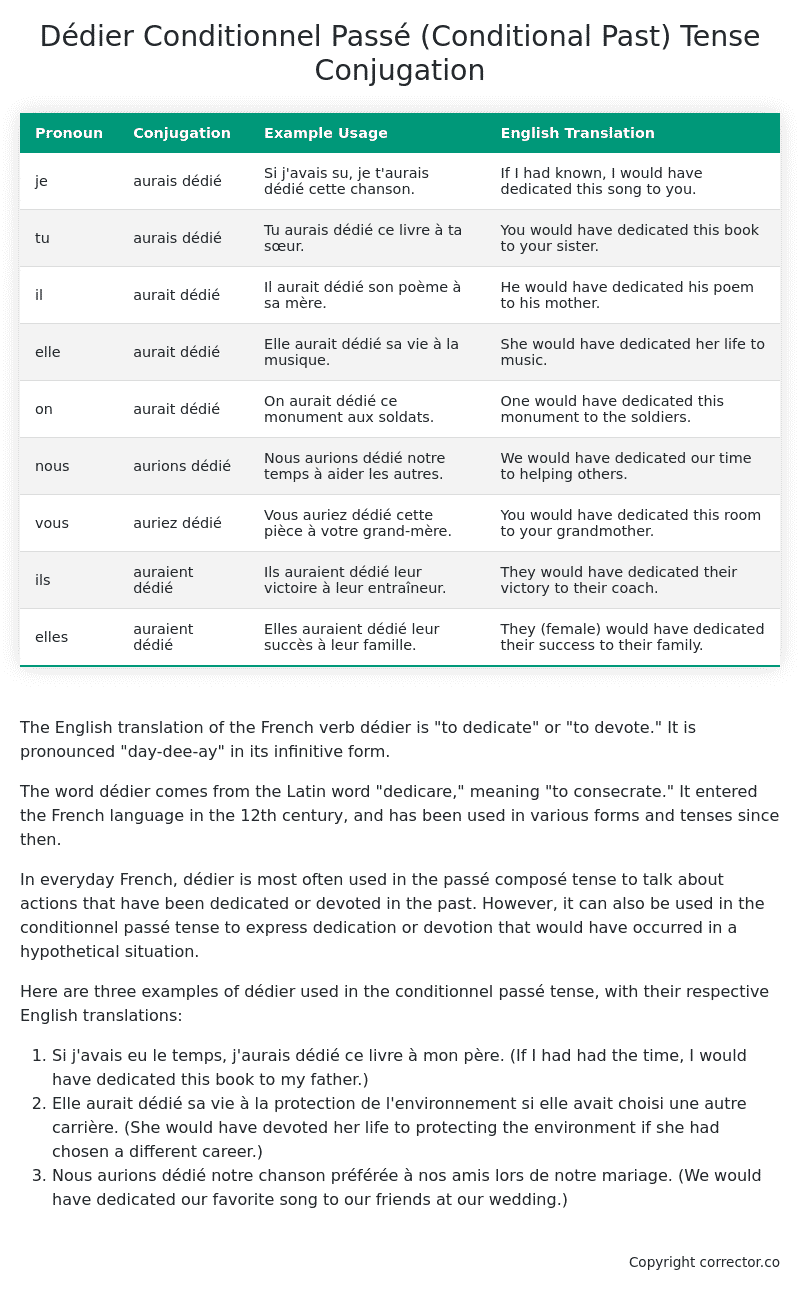Conditionnel Passé (Conditional Past) Tense Conjugation of the French Verb dédier
Introduction to the verb dédier
The English translation of the French verb dédier is “to dedicate” or “to devote.” It is pronounced “day-dee-ay” in its infinitive form.
The word dédier comes from the Latin word “dedicare,” meaning “to consecrate.” It entered the French language in the 12th century, and has been used in various forms and tenses since then.
In everyday French, dédier is most often used in the passé composé tense to talk about actions that have been dedicated or devoted in the past. However, it can also be used in the conditionnel passé tense to express dedication or devotion that would have occurred in a hypothetical situation.
Here are three examples of dédier used in the conditionnel passé tense, with their respective English translations:
- Si j’avais eu le temps, j’aurais dédié ce livre à mon père. (If I had had the time, I would have dedicated this book to my father.)
- Elle aurait dédié sa vie à la protection de l’environnement si elle avait choisi une autre carrière. (She would have devoted her life to protecting the environment if she had chosen a different career.)
- Nous aurions dédié notre chanson préférée à nos amis lors de notre mariage. (We would have dedicated our favorite song to our friends at our wedding.)
Table of the Conditionnel Passé (Conditional Past) Tense Conjugation of dédier
| Pronoun | Conjugation | Example Usage | English Translation |
|---|---|---|---|
| je | aurais dédié | Si j’avais su, je t’aurais dédié cette chanson. | If I had known, I would have dedicated this song to you. |
| tu | aurais dédié | Tu aurais dédié ce livre à ta sœur. | You would have dedicated this book to your sister. |
| il | aurait dédié | Il aurait dédié son poème à sa mère. | He would have dedicated his poem to his mother. |
| elle | aurait dédié | Elle aurait dédié sa vie à la musique. | She would have dedicated her life to music. |
| on | aurait dédié | On aurait dédié ce monument aux soldats. | One would have dedicated this monument to the soldiers. |
| nous | aurions dédié | Nous aurions dédié notre temps à aider les autres. | We would have dedicated our time to helping others. |
| vous | auriez dédié | Vous auriez dédié cette pièce à votre grand-mère. | You would have dedicated this room to your grandmother. |
| ils | auraient dédié | Ils auraient dédié leur victoire à leur entraîneur. | They would have dedicated their victory to their coach. |
| elles | auraient dédié | Elles auraient dédié leur succès à leur famille. | They (female) would have dedicated their success to their family. |
Other Conjugations for Dédier.
Le Present (Present Tense) Conjugation of the French Verb dédier
Imparfait (Imperfect) Tense Conjugation of the French Verb dédier
Passé Simple (Simple Past) Tense Conjugation of the French Verb dédier
Passé Composé (Present Perfect) Tense Conjugation of the French Verb dédier
Futur Simple (Simple Future) Tense Conjugation of the French Verb dédier
Futur Proche (Near Future) Tense Conjugation of the French Verb dédier
Plus-que-parfait (Pluperfect) Tense Conjugation of the French Verb dédier
Passé Antérieur (Past Anterior) Tense Conjugation of the French Verb dédier
Futur Antérieur (Future Anterior) Tense Conjugation of the French Verb dédier
Subjonctif Présent (Subjunctive Present) Tense Conjugation of the French Verb dédier
Subjonctif Passé (Subjunctive Past) Tense Conjugation of the French Verb dédier
Subjonctif Imparfait (Subjunctive Imperfect) Tense Conjugation of the French Verb dédier
Subjonctif Plus-que-parfait (Subjunctive Pluperfect) Tense Conjugation of the French Verb dédier
Conditionnel Présent (Conditional Present) Tense Conjugation of the French Verb dédier
Conditionnel Passé (Conditional Past) Tense Conjugation of the French Verb dédier (this article)
L’impératif Présent (Imperative Present) Tense Conjugation of the French Verb dédier
L’infinitif Présent (Infinitive Present) Tense Conjugation of the French Verb dédier
Struggling with French verbs or the language in general? Why not use our free French Grammar Checker – no registration required!
Get a FREE Download Study Sheet of this Conjugation 🔥
Simply right click the image below, click “save image” and get your free reference for the dédier Conditionnel Passé tense conjugation!

Dédier – About the French Conditionnel Passé (Conditional Past) Tense
Formation
Common Everyday Usage Patterns
Expressing Unreal Past Scenarios
Polite Requests or Suggestions
Expressing Doubt or Uncertainty
Interactions with Other Tenses
Conditional Present
Indicative Past Tenses
Conditional Future
Summary
Want More?
I hope you enjoyed this article on the verb dédier. Still in a learning mood? Check out another TOTALLY random French verb conjugation!


